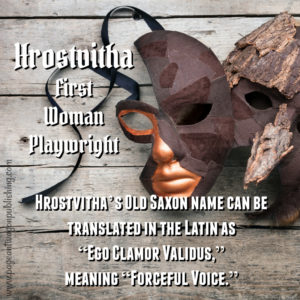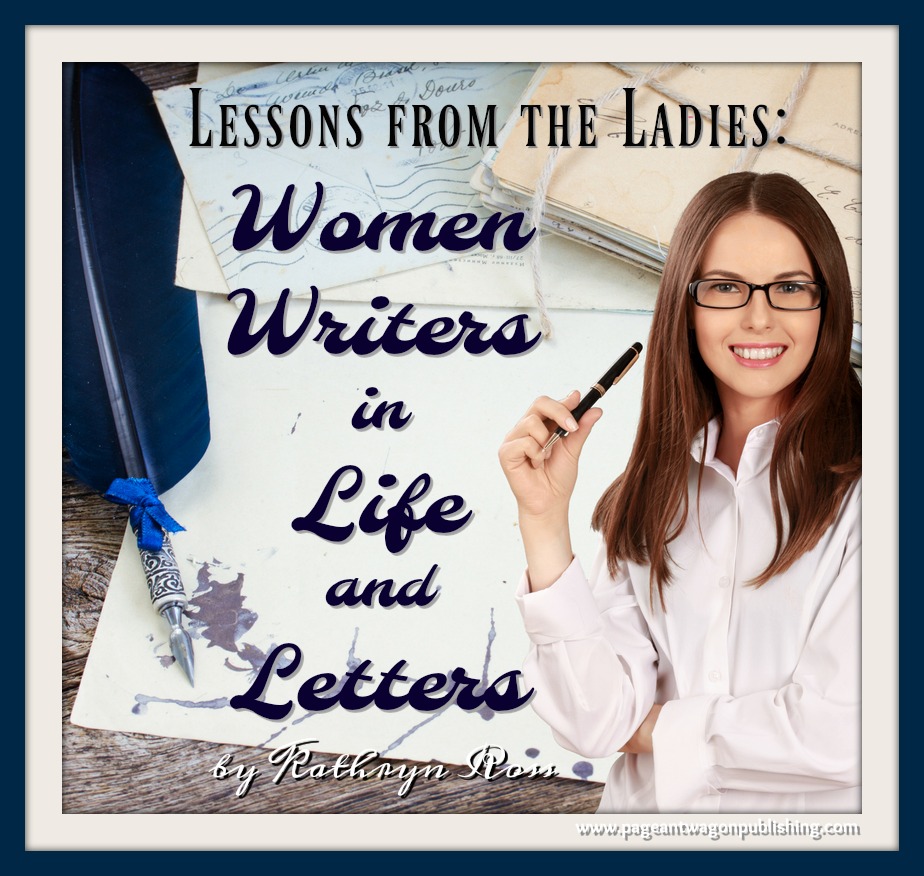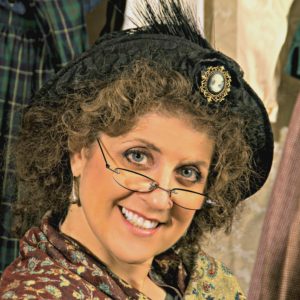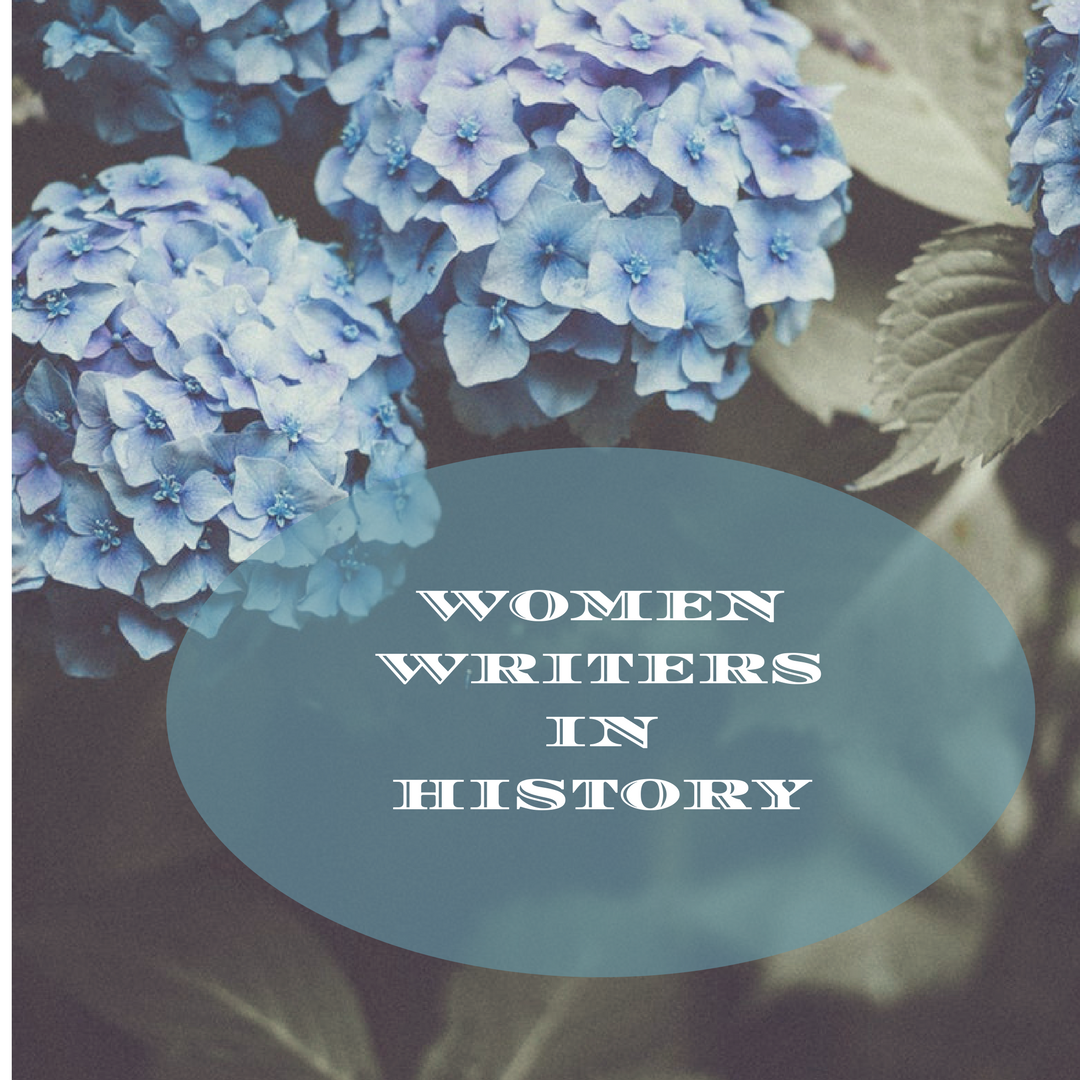Until the last century, men dominated the realms of literature, letters, and learning. We read nothing of women exchanging rhetoric and positing thesis among the ancients and classic philosophers of Greece. In fact, the doors of academia and literature largely shut women out in Western culture, relegating them to second class citizenship for a variety of reasons not to be discussed here.
After the fall of Rome in the 5th century, the spread of Christianity allowed greater opportunities for women as readers and writers. Out of the chaos in the dark ages, ordered communities centered around the establishment of Christian monasteries and abbeys—the lifeline of literacy, scholarship, and intellectual life. Cloistered living afforded devout men and women a way to balance devotion, work, and study.
Into this world, Hrostvitha (rose-vee-tuh) was born in 935, a daughter of noble birth in Gandersheim, Germany. She could look forward to many privileges otherwise denied to the greater population of women, including education. Her faith, formed in childhood, put her on the path to the monastic life. She committed her life to the abbey as a “canoness,” a level allowing her free movement in and out of the cloister as a nun. She was schooled in reading and writing in a number of languages. A student of Greek and Roman classics, the plays of Terence captivated her imagination, even though she feared the subject matter would corrupt Christian readers.
Her voracious reading, as with most writers in any age, evolved into prolific works from her own pen, including poetic hagiography (biography of saints), history, and prose, illustrating powerful biblical themes. By 962 she turned to playwriting, focusing on women as the central characters and drivers of the plot. This was groundbreaking in the annuls of literature and the propagation of the Gospel in her time.
Comparative literature professor, Sandro Sticca, notes how she “utilized women as visible and vibrant figures to transmute, with unexampled immediacy into drama, the deep spiritual experience of the human drama of salvation.” Further exploring her contribution to our Western Christian literary heritage, Sticca states:
 . . . in her six dramas, Hroswitha’s fundamental purpose is to celebrate in dramatic form a symbolic representation of the spiritual wrestlings of her female dramatis personae, virgins, martyrs, and sinners, who find moving dignity and religious fulfillment in the conflicting demands of sin and salvation, the dramatic context within which the drama of human salvation is articulated.
. . . in her six dramas, Hroswitha’s fundamental purpose is to celebrate in dramatic form a symbolic representation of the spiritual wrestlings of her female dramatis personae, virgins, martyrs, and sinners, who find moving dignity and religious fulfillment in the conflicting demands of sin and salvation, the dramatic context within which the drama of human salvation is articulated.
Hrostvitha transformed biblical principles into compelling stories to captivate the imagination of readers with spiritual truths. She played a key role in the development of liturgical drama, laying a foundation as a playwright—the first female playwright. Though little known beyond the religious circles of her own time, her six plays and manuscript collections were rediscovered some 500 years later, eventually finding their way to the stage and broader audiences via the traveling pageant wagons. Through drama and storytelling, pageant wagons discipled cities, towns, and villages with Bible teaching.
Hrostvitha’s Old Saxon name can be translated in the Latin as “Ego Clamor Validus,” meaning “Forceful Voice.” Writers could ask for no greater honor than to be tagged as such. What can we learn from this literary lady of history?
- Educate yourself as a writer of intelligence and scholarship.
- Read voraciously, choosing a broad scope of material for your reading list.
- Don’t neglect the classics—glean from the masters of Western literature and thought.
- Seek cloistered time in silence, reflection, and prayer, to better focus your writing.
- Allow your passion to guide your message—write true to yourself and your characters.
- Know your readers and write to clearly communicate and enrich their lives.
- Don’t fear if your audience reach is limited—God will bring your words and “forceful voice” to its full destiny in due season.
Journal Prompt: Choose one or two of the bullet points above where you feel you may be weakest. Explore how you can improve from Hrostvitha’s example and literary legacy.
TWEET:[bctt tweet=”What a German nun who lived over 1000 years ago taught me about #playwriting.” username=”@A3forme @A3writers”]
TWEET:[bctt tweet=”#Women in Life and Letters— #Writing Lessons from the Ladies” username=”@A3forme @A3writers”]
References:
Medieval Women’s Visionary Literature, by Elizabeth Alvilda Petroff, New York, Oxford, Oxford University Press, 1986
Living Theatre, A History, Fourth Edition, by Edwin Wilson and Alvin Goldfarb, copyright 2004, 2000, 1994, 1983, ARR
Writer-speaker, Kathryn Ross, ignites a love of literature and learning through Pageant Wagon Productions and Publishing. She writes and publishes homeschool enrichment and Christian living books for home, church, and school. Her passion is to equip women and families in developing a Family Literacy Lifestyle, producing readers and thinkers who can engage the world from a biblical worldview. She blogs and podcasts at TheWritersReverie.com and PageantWagonPublishing.com. Connect with Miss Kathy on Facebook.






No Comments